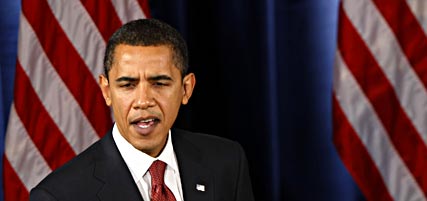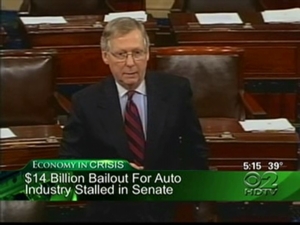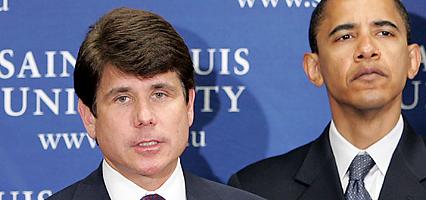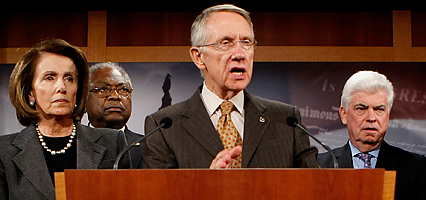WASHINGTON – President-elect Barack Obama's plan for economic revival puts a big emphasis on public works projects. It also would rely on tax cuts.
But with the nation bruised by recession, with hundreds of thousands of jobs vanishing monthly, Obama's plan raises an urgent question: Will his remedies work fast enough?
The answer won't be clear for months or longer. In the meantime, pressure on the Obama team to deliver help quickly is intensifying.
At least as designed, the Obama plan, like a calibrated drug regimen, aims to deliver both short- and long-term relief.
The short-term help would flow partly from tax cuts of $1,000 for couples and $500 for individuals, costing about $140 billion over 2009-2010. The Obama team, said two congressional Democratic aides familiar with the discussions, will likely deliver those tax cuts by reducing the tax withheld from paychecks.
This would put more money in paychecks, unlike the lump-sum rebates issued earlier this year. Many people used those rebates to pay down debt, rather than spending them as the administration had hoped.
In addition, states would get up to $200 billion over two years for Medicaid health coverage for the poor and to narrow state budget gaps, which are forcing layoffs and cuts in services. The aides spoke on condition of anonymity to candidly discuss the evolving plan.
Also in the short term, the nation's governors are pushing a wish list of $136 billion in jobs-producing public works projects — chiefly road and bridge repairs — that they say are ready to go.
But even if they are, the Obama administration faces a much harder task, too: creating jobs that won't disappear once a bridge is fixed. What's needed are millions of permanent jobs that would put legions of laid-off people back to work for years to come.
It's too soon to know whether many of the 2.5 million jobs the president-elect has said he intends to "save or create" within his first two years would become permanent. And with economic signs worsening, Obama wants to raise the goal to 3 million jobs, a presidential transition official said.
For now, given the depth of the recession, the Obama plan focuses on the early months.
By embracing projects already in the pipeline and stressing infrastructure repairs, parts of the plan could roll out soon — perhaps within weeks — creating jobs and stirring economic activity. That way, the new administration also buys time to allocate money for other projects that might take years to complete.
"Looking after the existing infrastructure is not as exciting as cutting ribbons on new projects, but it could generate jobs quickly," Martin Baily, who served as President Bill Clinton's top economist and is now at the Brookings Institution, told Congress.
Economists say the combination of tax cuts and infrastructure spending could deliver a quick one-two punch against the recession: the faster-acting tax breaks, plus the time-released benefits of infrastructure spending.
"You need a cocktail of drugs to go after this recession," said Sean Snaith, economics professor at the University of Central Florida. "It needs to be a multipronged attack."
Obama is proposing a package priced at perhaps $675-$775 billion over two years, his advisers say, though they think add-ons by lawmakers could raise the price to $850 billion. His advisers say an $850 billion plan could generate about 3.2 million jobs by the first quarter of 2011.
Some economists favor an even bigger spending stimulus: up to $1.3 trillion.
Vice President-elect Joe Biden said Tuesday, though, that anyone expecting a bounty of pet projects should think again.
"There will be no earmarks" in the stimulus plan, Biden said at the start of a meeting of Obama's economic staff, referring to the special-interest projects that lawmakers often attach to legislation.
Obama said his plan would "make the single-largest new investment in our national infrastructure since President Eisenhower established the Interstate Highway System in the 1950s."
For each $1 invested in infrastructure spending, around $1.60 in economic activity would be generated, according to estimates by some economists.
Put a different way: Peter Morici, economist at the University of Maryland, projects that $100 spent on a bridge or school boosts economic activity by about $200. (That doesn't count the benefit of improving Americans' longer-term productivity. For instance, better roads could reduce commuting times or help get goods to customers more efficiently.)
Can tax cuts help rejuvenate the economy? Some are skeptical.
"Most infrastructure spending will create more jobs by year-end 2010 than a tax cut, particularly a temporary tax cut," said Mark Zandi, chief economist at Moody's Economy.com. "Some of any tax cut will be saved. And some of it will be spent on imported goods, reducing its jobs impact."
The rap on infrastructure projects as an economic boon has been that they can be too slow to work — at least six or nine months to kick in. But that's less of an issue now because the economy's weakness is expected to last for so long — perhaps into 2010 and possibly beyond.
"I think in this case it is right," said Simon Johnson, former chief economist to the International Monetary Fund and a professor at the Massachusetts Institute of Technology's Sloan School of Management. "A lot of U.S. infrastructure is run down. Compared to other rich countries, the U.S. is lagging behind."
Still, timing is tricky. Public works projects need to roll out while the economy is still hurting. If they launch after the economy has rebounded, they could drive up costs and wages and fan inflationary forces. A more philosophical matter is how much the government should be involved in industrial policy — in picking winners and losers.
Obama's vision of infrastructure goes beyond repairing or building roads and bridges. It includes modernizing schools, boosting high-speed communications networks and installing technology at hospitals and doctors' offices to electronically access medical records.
URS Corp. and Fluor Corp., which provide engineering and construction services, are among companies that could benefit from an infrastructure initiative, said Heiko Ihle, an analyst at Gabelli & Co. Other firms passed up would likely raise questions about the fairest and most efficient use of taxpayer money.
A more fundamental problem is today's work force is more skilled and specialized — and in some ways less fluid — than during the 1930s when President Franklin Roosevelt launched the New Deal during the Great Depression. The jobs Obama's stimulus plan would create wouldn't likely help laid-off white-collar workers.
"I don't think it's realistic to think you'll see unemployed financial services people and retail clerks flocking to construction," says Brian Bethune, economist at IHS Global Insight.
"So you have to be careful about not overdoing it and thinking this is going to be the savior of our problems. There are only a certain number of big engineering firms that can do certain big projects and only a certain number of workers skilled in those trades."
Whatever its ultimate size, the stimulus package will dig the government budget hole ever deeper. The U.S. is on track to hit a record budget deficit of $1 trillion or more for 2009 budget year, which began Oct. 1. That would be more than twice the previous record-high deficit set last year.
Yet despite the swelling costs, economists agree that forceful action with staying power is desperately needed.
"With negative or low economic growth projected well into the future, the economy needs a long-term fix," said John Taylor, a Stanford economics professor who held a top Treasury Department post in the Bush administration. "We need to worry about the next few years, not just the next few months."















